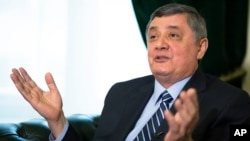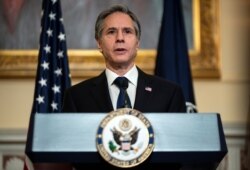Russia has sent invitations to leading Afghan politicians, the Taliban, and envoys of the United States, China, and Pakistan to participate in a three day conference starting March 18 on how to facilitate the peace process in Afghanistan.
The proposal was first floated by the Russian Special Envoy on Afghanistan Zamir Kabulov in an interview with the Russian Sputnik news agency last month.
Saying that the Doha peace negotiations seemed to have come to a standstill, Kabulov told the agency that his government had taken the Americans on board for a Moscow meeting.
“[W]e have another mechanism, which has emerged over the past 2 years, by the way, at the initiative of the Americans, and which we have supported - to form a small group of the states most influential on the Afghan processes, which, besides Russia, the USA and China, include, naturally Pakistan and Iran,” he told Sputnik.
Kabulov said Iran was hesitant to sit at the table with the Americans due to diplomatic differences but he was hopeful its position would change.
Afghan Foreign Minister Mohammad Hanif Atmar said his government was deliberating whether to attend the conference in Moscow.
Faraidoon Khwazoon, the spokesman of Afghanistan’s High Council for National Reconciliation (HCNR) also said the invitation was under consideration.
Dmitriy A. Zhirnov, the Russian ambassador in Kabul, has met several Afghan leaders, including Abdullah Abdullah and Hamed Karzai in past weeks.
Meanwhile, United Nations spokesperson Stephane Dujarric said the international agency had not yet received a formal request from the U.S. to convene a foreign minister level conference on Afghanistan.
“We've seen it because it was in the media, but we have... as far as I've checked, we have not received the letter officially,” he said.
However, he added that the U.N. was ready to “support any effort to reach a peaceful resolution to the conflict, and we stand ready to assist, if so requested by the parties.”
In a letter to Afghan President Ashraf Ghani, obtained by VOA last Sunday, U.S. Secretary of State Antony Blinken said the U.S. would ask the United Nations to “convene foreign ministers and envoys from Russia, China, Pakistan, Iran, India, and the United States to discuss a unified approach to supporting peace in Afghanistan.”
Those were the countries, according to the U.S. secretary of state, that had to work together for a chance at successfully resolving Afghanistan’s conflict.
The multiple simultaneous efforts to jumpstart a stalled peace process come under the shadow of a looming deadline of May 1, when, under a deal the U.S. signed with the Taliban in February 2020, the U.S. is supposed to withdraw all foreign forces from Afghanistan.
Many, including Secretary Blinken as per his letter, fear such a move, under the current security situation in Afghanistan, would mean the Taliban might make swift territorial gains.
Many in Afghanistan fear a repeat of the 1990s when, after the Soviet withdrawal and a collapse of the government, civil war engulfed the country, killing thousands and damaging the capital, Kabul, with repeated attacks.
The administration of President Joe Biden is reviewing the deal signed by the former administration of President Donald Trump, but has said that all options, including the complete withdrawal of its forces from Afghanistan, are still on the table.
Many Afghanistan experts say that if the U.S. unilaterally decides to stay in Afghanistan after May 1st, the Taliban would consider it a breach and may start the war against the U.S. again. After last year’s deal, the Taliban stopped attacking U.S. and NATO forces in the country.
U.S. peace envoy Zalmay Khalilzad was in Qatar last weekend to meet the Taliban and the group’s spokesman said he shared with them a proposal to take the peace process forward that includes setting up a transitional government in Afghanistan that includes the Taliban.
President Ghani and his senior officials have rejected the idea of a transitional government, saying the only way to change a government in Afghanistan is through elections.





